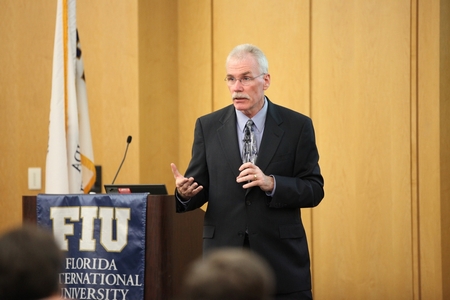Though recent focus on oil supplies has understandably zeroed in on the Middle East, an event at Florida International University (FIU), held just prior to the unrest in major oil producing countries, took the long view—toward 2030. It’s a perspective that ExxonMobil has shared each year since 2003 in “The Outlook for Energy,” a presentation on global trends for energy demand and supply, and the impact on carbon dioxide (CO2) emissions.
In 2011, approximately 100 attendees heard the latest version from Scott Nauman, an executive with ExxonMobil’s corporate strategic planning department.

“One important new observation concerned the growing and key role that natural gas is going to play in the energy mix over the coming years because of huge conventional and unconventional gas discoveries around the world, including the United States,” said Ed Glab, director of the Global Energy Security Forum in FIU’s School of International and Public Affairs (SIPA). “There are enough proven gas reserves in the United States to last 100 years at current rates of usage. This is good news for the environment because gas burns 60 percent cleaner than coal and about 40 percent cleaner than oil.”
Renewables make strong showing.
Nauman’s discussion of renewables caught the attention of Dilek Aksu, a student in FIU’s Evening MBA and a graduate assistant in the forum who helped organize the event.
“We talk a lot in the Forum about climate change, so it was interesting to hear that ExxonMobil sees that renewables have promise,” she said.

To George Philippidis, energy director of FIU’s Applied Research Center, the talk showed that “although fossil fuels will remain dominant energy sources this century, renewables, including biofuels, will progressively gain a larger fraction as their commercial development spreads around the world.”
In fact, Exxon, which is investing in biofuels from algae, predicts renewables will grow much faster than their fossil counterparts.
The College of Business Administration, SIPA and the Forum sponsored the event, which provided a special benefit to Aksu.
“We are studying to be managers and it’s very helpful to learn about industries and see how they are changing,” she said.

